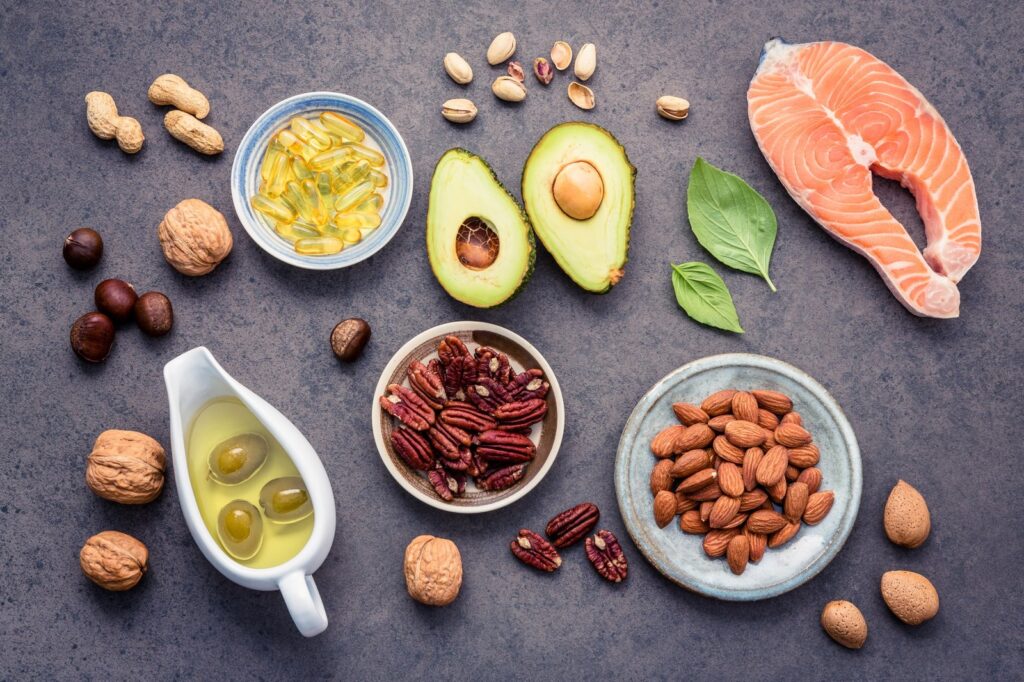For years, fats have been misunderstood. Many people think eating fat makes you fat, but that’s not true! Fats are super important for our body—they keep our brain sharp, help absorb vitamins, and even give us energy. In India, our food is filled with different kinds of fats, from the ghee on our rotis to the coconut oil in our curries. So instead of avoiding fats, let’s learn how to include the right ones in our diet.
The Different Types of Fats
Not all fats are the same—some are good, some are okay in moderation, and some should be avoided. Here’s a simple breakdown:
1. The Good Fats (Unsaturated Fats)
These are the healthiest fats that keep your heart happy and your body strong.
- Monounsaturated Fats (MUFA): Found in mustard oil, groundnut oil, almonds, and cashews, these fats help lower bad cholesterol and support heart health.
- Polyunsaturated Fats (PUFA): These include omega-3 and omega-6 fatty acids, which are great for brain function and reducing inflammation. You’ll find them in flaxseeds (alsi), walnuts, sunflower seeds, and fatty fish like rohu and hilsa.
2. The Okay Fats (Saturated Fats)
These fats are common in traditional Indian foods like ghee, coconut oil (especially in South India), and full-fat dairy. Earlier, people thought they were bad for the heart, but now we know that moderate amounts—especially homemade ghee—can actually be good for digestion and overall health.
3. The Bad Fats (Trans Fats)
These are the ones to avoid. Trans fats are found in processed snacks like namkeens, deep-fried samosas, and bakery products. They increase the risk of heart disease, so it’s best to cut them out of your diet.
How Fats Are Processed in Your Body
Wondering what happens when you eat a spoonful of ghee or a handful of nuts? Here’s how your body handles fats:
- Digestion Starts in the Mouth: Your saliva starts breaking down fats as soon as you eat.
- The Stomach Gets to Work: Your stomach’s acids break fats down into smaller parts.
- Bile from the Liver Helps Out: This helps make fats easier to digest.
- Enzymes Do Their Magic: Your pancreas releases enzymes that turn fats into tiny molecules that your body can absorb.
- Fats Are Used or Stored: Your body either uses fats for energy right away or stores them for later.
Why You NEED Fats in Your Diet
- For Energy: Fats give you 9 calories per gram—more than double what carbs or proteins provide.
- For Brain Health: Your brain is 60% fat! Healthy fats help you think clearly and may prevent memory problems later in life.
- For Vitamin Absorption: Vitamins A, D, E, and K can only be absorbed if you have fats in your diet.
- For Hormones: Your body needs fats to produce hormones like testosterone and estrogen, which are essential for health and mood.
How Much Fat Should You Eat?
The amount of fat you need depends on your lifestyle, health goals, and medical conditions. In general, 20-35% of your daily calories should come from fats. If you’re trying to lose weight, stick to the lower end of the range and focus on unsaturated fats.
How to Add Healthy Fats to Your Indian Diet
- Use traditional oils wisely: Mustard oil, coconut oil, and groundnut oil are better than refined vegetable oils.
- Have ghee in moderation: A teaspoon of ghee on your dal or roti can be good for digestion.
- Snack on nuts and seeds: Munch on almonds, walnuts, flaxseeds, and sesame seeds (til) instead of chips.
- Eat fatty fish if you’re non-vegetarian: Traditional dishes like Bengali mustard fish or Kerala fish curry are great sources of omega-3.
- Cut down on deep-fried and processed foods: Try to limit store-bought namkeens, bhujias, and bakery snacks.
- Choose full-fat dairy (but don’t overdo it): Homemade curd, paneer, and milk are good sources of healthy fats.
The Bottom Line
Fats are NOT your enemy—they’re essential for good health. The trick is to eat the right ones and avoid the bad ones. Our Indian diet already has amazing sources of healthy fats like ghee, mustard oil, and nuts, so let’s embrace them mindfully. Eat smart, enjoy your food, and stay healthy!

